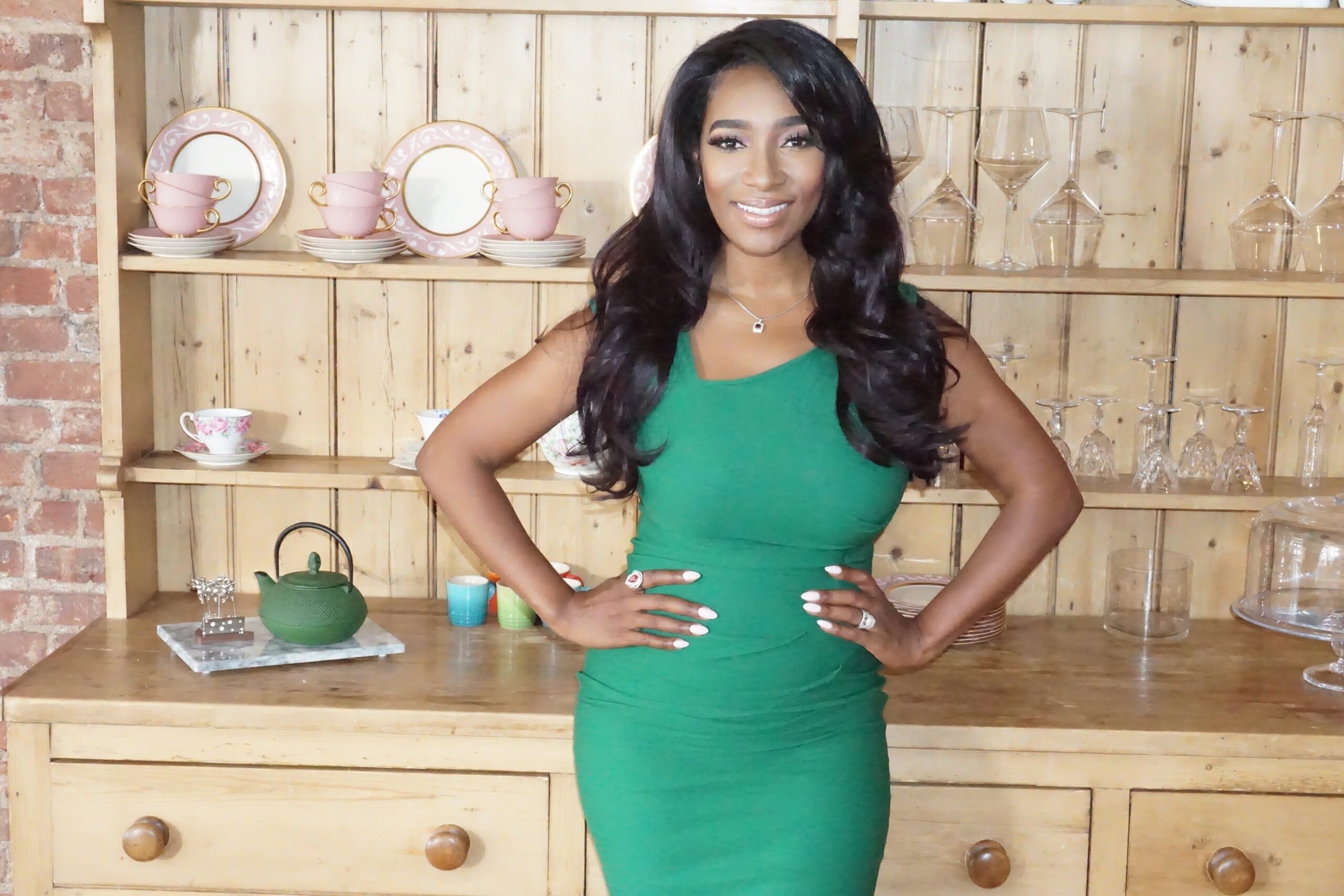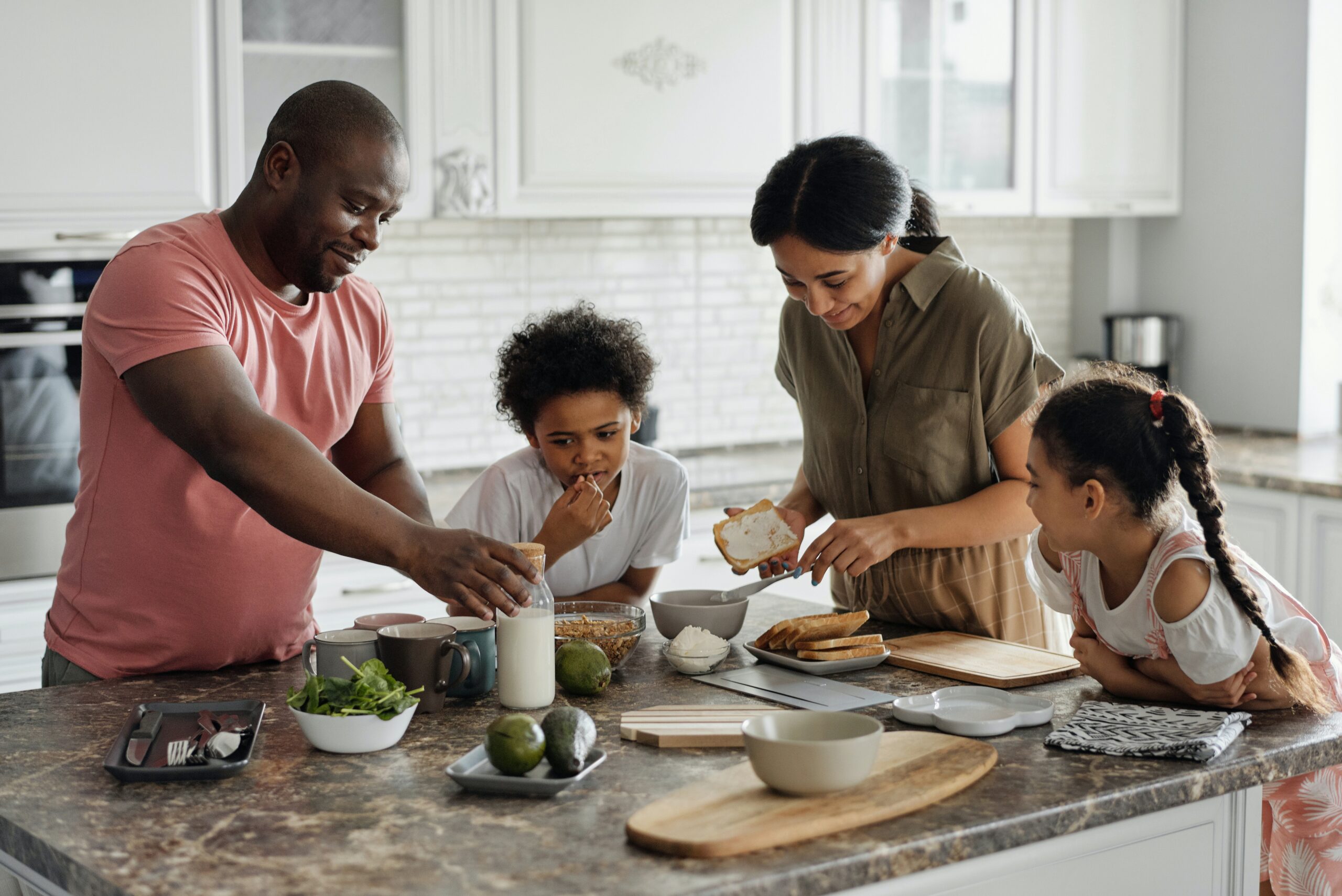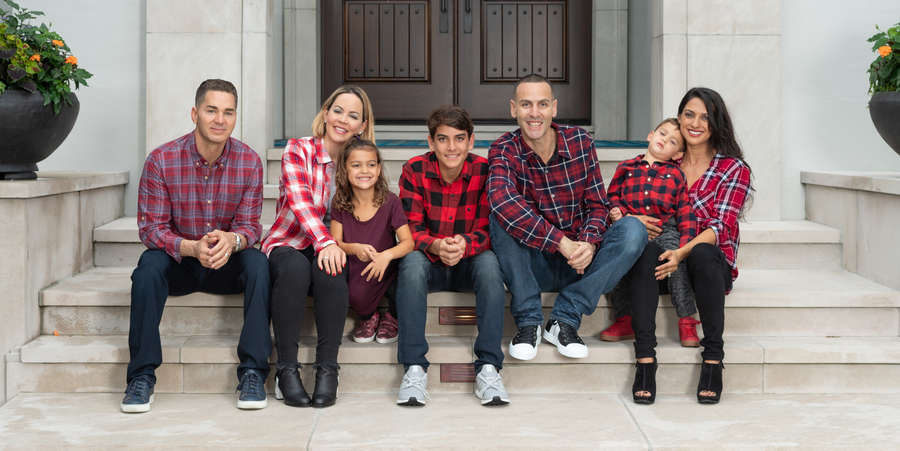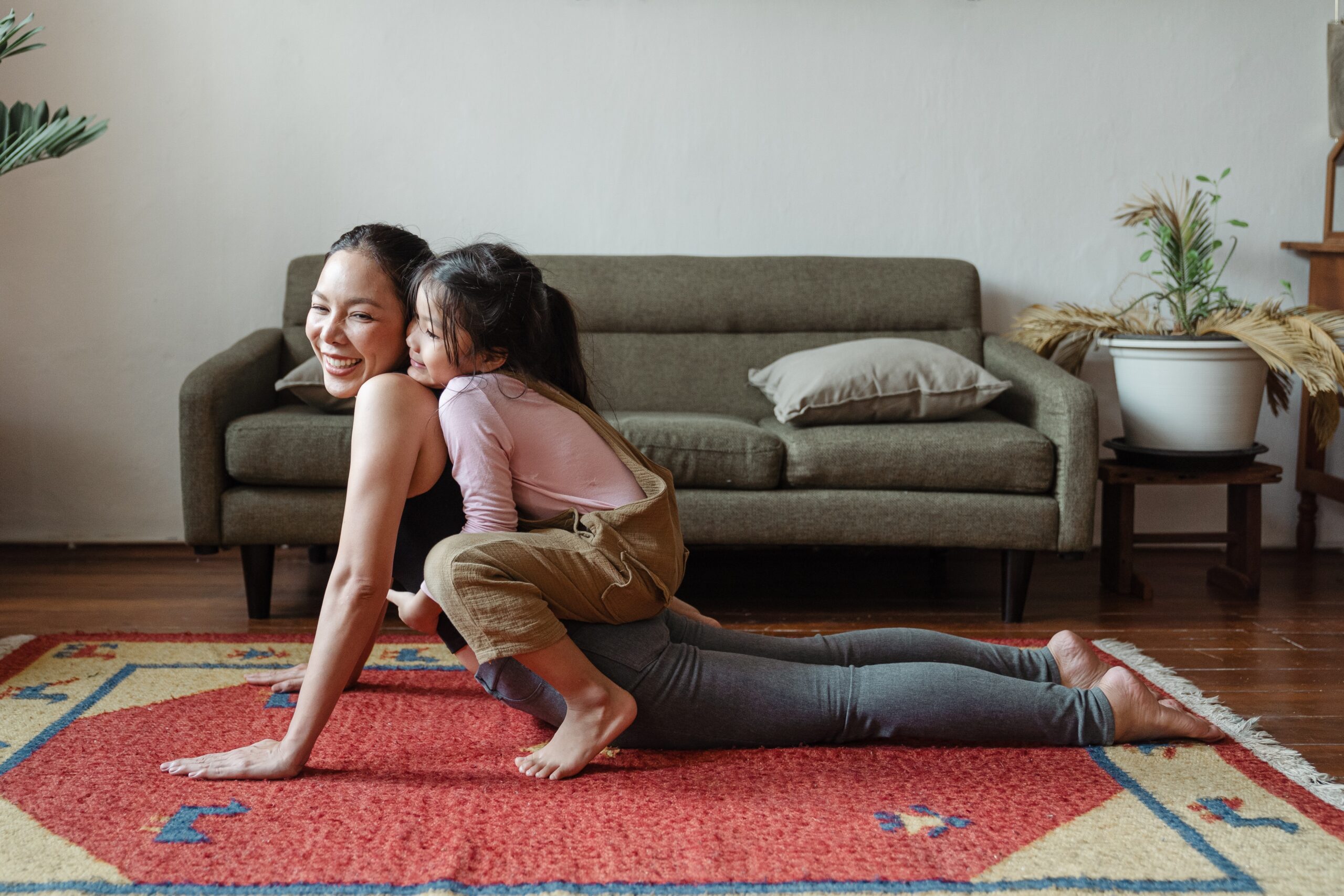
A Conversation with Naja Hall
Our Happy Divorce Tuesday, November 17, 2020
This week, Ben, Susan and Kate had a conversation with Naja Hall to talk all things blended families and parenting through divorce.
Naja is the founder of BlendedandBlack.com, the number one destination for millennials in step families, and the host of the leading podcast I Know I’m Crazy. As a Certified Coach and Educator, she understands that the family is THE MOST influential entity of human development, and her work centers around helping individuals, couples, and families navigate some of life’s toughest transitions.
The group talked through all the things parents should consider when blending their families.
- The unavoidable truths of being a step-parent: The number one experience Naja shared is that you may end up in a situation where people don’t want you there, and they may not be afraid to let you know that. There can be a sense of rejection and isolation. It’s important to realize that there’s already a family dynamic in place and it’s important for you to find a way to fit in instead of disrupting it.
- Know your place: The group agrees that it’s important for all step-parents to realize that the children already have a mother and father. It’s okay for the step-parent to play the role of “cool Auntie.” There will eventually be a time when the kids will come to you for advice and attention, and that’s when you can shine.
- The step-parenting role transitions over time. Sometimes it can take 5-7 years for a family to blend. It’s important to move slowly so that it doesn’t seem like the step-parent is stepping in to take over. It takes time to build trust. The best way to do this is by spending extra, one-on-one time with each child.
- Problems when blending families: The most common problem we see is blending the family too soon. The group agrees that the right time to introduce the children is when you know the relationship has staying power. It’s also not fair to the children to wait too long. Tune in to your kids and they’ll let you know when it’s ready.
Throughout the livestream, the group shares their own personal experiences in blended families, the difference between resentment and forgiveness, and discuss when it’s time to turn to an attorney in the divorce process.
Don’t forget to follow us on all of our social channels: Facebook, Instagram, Twitter, and LinkedIn. If you’d like to join our private Facebook community, please visit the Our Happy Divorce Facebook Group.
Naja Hall is the founder of VIPStepmom and Blended and Black. As the host of the popular podcast, I Know I’m Crazy with Naja Hall, and author of the Amazon best-seller Girl, Bye! book series, Naja’s life’s work is to teach empathy, accountability, and emotional intelligence through the art of story-telling and genuine human connections. You can find her at blendedandblack.com and VIPStepmom.com.
To learn more about Kate Anthony and The Divorce Survival Guide, visit her on Facebook and Instagram or visit KateAnthony.com. Listen to her podcast at: kateanthony.com/podcast-1.
Discover more about Susan Guthrie and The Divorce and Beyond Podcast on Facebook and Instagram or at DivorceandBeyond.org. Listen to the Divorce and Beyond Podcast here: divorceandbeyond.podbean.com.

Divorcing Right to Parent Right
Our Happy Divorce Tuesday, November 10, 2020
The way you divorce can have a major impact on the way you are able to co-parent in the future. Julia Dennison, the digital content director of Parents.com and host of the We Are Family podcast, joined Ben, Kate and Susan to discuss divorcing right to parent right.
As a child, Julia’s grandparents went through a bitter divorce and her father said he wished people could go to “Divorce School.” This stuck with her when she went through her own divorce with a 1-year-old daughter.
Ben, Kate, Susan and Julia shared the most important lessons from their own Divorce School experiences:
- Don’t sweat the small stuff. This advice comes up frequently because it’s so important for co-parents to pick their battles. When a disagreement arises, take a few moments to reset your perspective and ask yourself if this battle truly matters.
- Remember your top priority: the kids. If you and your co-parent are both focused on what’s best for the kids, you’ll actually agree on more than you think. Throughout the divorce, keep your focus on your plan to parent well. When facing different decisions, it’s important to consider which outcome is best for the kids.
- Rethink your parenting roles. Divorce causes you to confront the mental boundaries you’ve placed on your co-parent. Often, mothers see themselves as the primary caregiver. This can cause fathers to feel inferior. In order to co-parent successfully, you must trust that your co-parent is capable of caring for the children. You may do things differently, but that doesn’t mean they’re better.
- Shift your perspective. When you co-parent and share custody, you will have periods where you are alone. Instead of viewing this as a negative thing, use this time to recharge!
Listen to the full livestream to hear more about how COVID is impacting co-parenting and important co-parenting considerations for same-sex couples. Stream Divorcing Right to Parenting Right now.
Don’t forget to follow us on all of our social channels: Facebook, Instagram, Twitter, and LinkedIn. If you’d like to join our private Facebook community, please visit the Our Happy Divorce Facebook Group.
Julia Dennison is the digital content director at Parents.com and the host of the We Are Family podcast. Follow her on Instagram @juliadennison.
To learn more about Kate Anthony and The Divorce Survival Guide, visit her on Facebook and Instagram or visit KateAnthony.com. Listen to her podcast at: kateanthony.com/podcast-1.
Discover more about Susan Guthrie and The Divorce and Beyond Podcast on Facebook and Instagram or at DivorceandBeyond.org. Listen to the Divorce and Beyond Podcast here: divorceandbeyond.podbean.com

Shame and Divorce
Our Happy Divorce Tuesday, November 3, 2020
Shame is an extremely common emotion in divorce, but it’s one that not many people speak openly about. Ms. Renee Bauer joins Ben Heldfond and Susan Gutherie to discuss the shame of divorce and how to work through it in order to move forward with a happy divorce.
Ms. Bauer is an award-winning divorce attorney, published author and founder of the family law firm, Bauer Law Group. She is committed to empowering all women to redefine their sense of peace and purpose in their new life. She also went through her own divorce and has personally experienced these feelings of shame and unworth.
Shame during divorce comes from both internal and external forces. You can feel shameful that your marriage ended, shameful that you failed in some way, shameful about having to tell your family and friends.
Here’s what you need to know about shame and divorce:
- You are not alone in your feelings. Although no one really talks about the shame around divorce, it’s an extremely common feeling. And because no one talks about it, the feelings you are experiencing can feel even more shameful. More than 50% of marriages end in divorce, you are NOT alone in this experience. Shame is an equal gender offender, and it’s okay to feel shame during your divorce.
- Shame is something to work through: It’s important to separate the emotional side of your divorce from the business side of your divorce. There are no shortcuts for shame, and avoiding it isn’t a sustainable approach. This leads to resentment and can make it more difficult to work through the business side of your divorce. It’s important to acknowledge the shame you feel, sit with it, and allow yourself to learn from it. Your divorce isn’t the beginning and ending of your story, it’s just one moment in it.
- Putting your kids first can help you deal with your feelings: When you keep your kids first in your divorce and focus on what’s best for them, it can help you begin to move forward. With your focus on the kids, it’s harder to focus on all the negative things about your former partner. Focusing on your kids gives you a purpose and motivation to work through your emotions and be more present.
- Divorce brings out the worst, not the best: There is nothing positive or self-esteem building about a divorce. No matter what circumstances led to your divorce, shame and failure are common emotions. It’s common to try to make the divorce someone’s fault. This is a bandaid fix for shame.
- Fake it till you make it: It can be difficult to communicate when you are in an emotional divorce. When that’s the case, try faking it until you make it. Communicate with your ex the way you would with your boss: no emojis, no ALL CAPS texts, no negativity. Be cool and professional. Keep your emotions out of your communications. It’s the only way to begin moving forward.
Listen to the rest of the livestream to learn more about processing the shame you feel in divorce and how a simple cup of coffee can change the tone of your relationship with your ex!
Don’t forget to follow us on all of our social channels: Facebook, Instagram, Twitter, and LinkedIn. If you’d like to join our private Facebook community, please visit the Our Happy Divorce Facebook Group.
Learn more about Ms. Renee Bauer on her website and on Instagram.
Discover more about Susan Guthrie and The Divorce and Beyond Podcast on Facebook and Instagram or at DivorceandBeyond.org. Listen to the Divorce and Beyond Podcast here: divorceandbeyond.podbean.com
Blending the Family: The Right Way
Our Happy Divorce Tuesday, October 27, 2020
Blending families is complicated. It’s also an ongoing process that evolves over time. Ben, Susan and Kate welcomed Mike Mulder and Summer Felix-Mulder, spouses, coparents and hosts of the Everything Always podcast, to discuss how to blend families, the right way.
Mike and Summer dated for about 2 years before starting to blend their families together. Each has two children with their ex-spouse. Their podcast focuses on sharing what has worked, what hasn’t, and what they’re still working on when it comes to blending their families. Blending families is a unique situation for each family involved. There are many factors that influence the “right” way to blend a family, from the kids’ ages to what’s going on in the other parent’s household, even a global pandemic can greatly change the way blended families parent.
To help you better understand the dynamics of blended families and how you can successfully blend your family, Mike and Summer along with Ben, Susan and Kate shared their personal experiences in this episode of the livestream: Blending the Family: The Right Way.
- Where do you want to place your children? One of the most helpful questions is, “Do you want to place your children in the center of your divorce, or in the middle of it?” Placing your child in the center of your divorce means focusing on what’s best for them. Placing them in the middle of the divorce means placing your emotions and stresses on them and using them as a pawn in the divorce. It’s important to keep your children at the center of your relationship with your co-parent, not in the middle of it.
- There’s no guidebook to perfect parenting. The relationships in blended families are always evolving. As children get older, they can better navigate two different households. As co-parents and step-parents and new spouses all become more familiar with each other, communication will get easier. Over time, it’s also easy to learn how to best communicate with your ex-spouse about important parenting topics.
- Who does the “heavy parenting”? In a blended family, there are a lot of parent figures. It’s important that the adults and children both understand the roles of each parent and their authority. At first, step-parents do not have the authority to parent the new kids in their lives. Over time, they may gain that authority to step in on more and more parenting moments, but it’s also equally important to rely on the biological parent for the heavy parenting. Typically, biological parents should be the ones doing any heavy discipline or parenting with their kids.
- How to achieve peace in the home: Even in a high conflict divorce, it’s possible to achieve peace in your home with your blended family. It’s important to understand what you can control (what takes place in your own home), and what you can’t control (what happens at your ex’s). Set aside your ego and avoid the desire to control what happens in the other household. Remember that you can control things like the dinner routine, homework expectations and bedtimes in your own home. You can have a conversation with your ex about these expectations in their home, but ultimately you can only control what happens in your own home. It’s important to set your ego aside.
- Co-parenting in a pandemic: The global COVID-19 pandemic has created unique challenges for blended families. Children are moving back and forth between two households that may have different rules about quarantining and safety practices. Again, ultimately you can only control what happens in your own home. It’s a good idea to communicate openly about your concerns and expectations and find a way to peacefully co-parent these children who are learning to live in a new world, too.
Listen to the full livestream with Mike and Summer Mulder to hear even more tips from our experts on positive communication in blended families, how to navigate conflict and how to keep your kids at the center of your divorce, not in the middle of it.
Don’t forget to follow us on all of our social channels: Facebook, Instagram, Twitter, and LinkedIn. If you’d like to join our private Facebook community, please visit the Our Happy Divorce Facebook Group.
Hear more of Mike and Summer Mulder’s blended family advice on their podcast, Everything Always. Follow them on Facebook and YouTube for more.
Discover more about Susan Guthrie and The Divorce and Beyond Podcast on Facebook and Instagram or at DivorceandBeyond.org. Listen to the Divorce and Beyond Podcast here: divorceandbeyond.podbean.com
To learn more about Kate Anthony and The Divorce Survival Guide, visit her on Facebook and Instagram or visit KateAnthony.com. Listen to her podcast at: kateanthony.com/podcast-1.
Co-Parenting as a Step-Parent During a Pandemic
Our Happy Divorce Tuesday, October 20, 2020
Navigating a COVID-19 as a blended family can present unique challenges for co-parents and step-parents. In successful blended families, step-parents are very much a part of the daily decisions and conversations about the children. Communication in blended families should extend beyond just biological co-parents.
We chatted with Nadia and Chad, Asher’s step-parents, about their advice for other step-parents during a pandemic.
Q: What has it been like to co-parent as stepparents during a pandemic?
Nadia: As one could imagine, it has been challenging! Trying to coordinate two households with three children of varying ages, social and emotional needs, while also remaining a united front has been a challenge. We are quite blessed to have the close bond that we share because we are able to communicate directly about our concerns for each member of our family and help find agreeable solutions.
Chad: It has been challenging as we navigated freedom versus safety for our kids.
Q: From your point of view, what was it like to quarantine as an entire family by sheltering in your own homes and only seeing each other?
Nadia: Better than the alternative!
Chad: It really brought us closer together as the safer-at-home order allowed us the opportunity to spend significant quality time together. From playing board games, card games or watching Netflix, we did together taking advantage of the free time we faced.
Q: What has been your favorite memory coming from quarantining together?
Nadia: Our children spent so much time together that they wouldn’t have otherwise had! The age gap is significant and so the littles got to spend EXTRA time with their big brother. So many sleepovers!
Chad: Playing Monopoly…which took three days to finish.
Q: What advice can you share for others who are co-parenting as stepparents during COVID?
Nadia: Talk to your co-parents in person. Avoid texting and allow yourself to be vulnerable, focus on “I” statements not YOU.
Chad: Support your spouse as we navigate these unprecedented times.
Coronavirus has thrown everyone for a loop and especially blended families who are living across households. In these unprecedented times, remember to communicate clearly with your co-parents (all of them!) and keep your focus on what’s best for the kids. We’ll get through this together.

The Effects of Divorce on Mental Health
Our Happy Divorce Tuesday, October 13, 2020
The beginning of a divorce can be confusing. While every divorce is different, most people will admit that the process is both mentally and physically stressful. Even an amicable divorce can cause a lot of change that can be difficult to manage. All of these changes can negatively impact your mental health.
The effects of divorce on mental health don’t necessarily happen right away, either. Divorce is a process and much like grief there are different stages to go through. We sat with Nadia Heldfond, a psychotherapist, co-owner of New Day Mental Health Counseling, and Ben’s wife, to discuss the effects of divorce on mental health so that you can be better prepared for the feelings you may experience.
Q: What are some of the common effects can divorce has on mental health?
Nadia: Leading up to divorce, people often feel anger, resentment, fear, a sense of loss, emotionally numb or shut down, and exhausted.
Divorce can be the second most stressful event in someone’s life. All of these feelings of uncertainty and hopelessness can lead to more serious emotional and mental health issues like anxiety and depression.
Divorce can also impact children’s mental health. A child’s age can greatly impact how they process divorce. Separation and divorce can aggravate existing mental health issues that children experience. It’s not uncommon for children’s academic performance to suffer, and rates of anxiety and depression are higher among children of divorce, too.
Q: In what ways have you seen the effects of divorce on mental health throughout your career and personal life?
Nadia: I have seen quite the variety of mental health effects. I feel that it depends on so many factors. Quite often people feel relieved when it’s over, the build-up to that decision and the actual divorce proceeding can be quite emotionally draining. Many people feel relieved to be out of a toxic, unhealthy or loveless marriage. Sometimes, I find people that hold a lot of resentment and have an unwillingness to see their own part in the collapse of their marriage. This can lead to a toxic co-parenting situation.
The emotional stages of divorce can be everything from relief to grief to resentment. All of these feelings are normal. Meeting with a licensed therapist can help you process these emotions and deal with everything you are experiencing.
Q: How can people support their loved ones who are struggling with mental health?
Nadia: Listening and acknowledging are the most important ways in which we can help each other. Humans often feel uncomfortable with someone else’s pain or discomfort. Our response is to try to make them feel better or “fix” the problem. Quite often, we say or do things that are contrary to being helpful and supportive. My best advice is to listen, to empathize and to sit in their discomfort beside them. Obviously, seek professional help if someone is at risk of harming themselves or someone else.
One in six people have experienced a mental health issue in the last week, so it’s very likely someone in your life is struggling. Sometimes the best thing you can do for someone who is struggling with their mental health, especially when it’s due to divorce, is remind them that you’re there for them.
Q: What are ways someone can handle mental distress during the divorce process?
Nadia: Self care and healthy coping routines are very important. Finding a great therapist that you connect with can be very useful during this process. Initiating and honoring healthy boundaries for yourself and for your soon-to-be ex will help tremendously with the mental stress of divorce.
If you find yourself in a rut of negativity, you may need to take a step back and examine yourself. You may need to ask yourself “Am I feeling disappointed, aggravated or taken advantage of?” If the answer is yes, then often that means that you need to STOP and assert a boundary.
Perhaps you are doing too much and getting too little in return. Perhaps you have less to offer your ex, than you are forcing yourself to give. The crazy thing about boundaries is that when we are feeling like it is someone else’s fault, someone is driving US crazy, that is the time we need to reflect on OURSELVES and evaluate why we allow this to happen. Remember, we teach people how to treat us.
Dealing with divorce stress begins with looking at yourself first. It’s important to pay attention to your emotional needs by finding a support group or therapist. Staying active can help, too, as physical activity can help your emotions rebalance. Meditation and yoga are positive ways to deal with the mental health effects of divorce.
What are a few healthy ways people can cope after a divorce?
Nadia: I smile because I see so many women that redecorate or recreate their new space as a single woman. Men may also do the same! Purchase that recliner that was always on the “no fly” list. I think this is healthy. Fitness, meditation, spirituality, education….these are all helpful ways to cope with the new life that you are embarking on. Exploring this new version of “you” more deeply without the partnership can be exciting and incredibly hopeful. It is also important to focus on the present moments and not the past.
It often feels like people expect you to be “over” your divorce just as soon as the final decree is signed. As you check in with your mental health after a divorce, remember that the healing process is never complete. Taking time to check in with yourself every so often is important. Divorce can impact your mental health in many different ways, including anxiety, depression, anger and hopelessness. All of these effects of divorce on mental health are 100% normal. Your feelings are valid. It’s important to acknowledge them and begin to heal the unhealthy emotions you’re feeling so that you can continue healing.

1 Year of Our Happy Divorce: A Look Back
Our Happy Divorce Tuesday, October 6, 2020
As we celebrate the one-year anniversary of launching our book, Our Happy Divorce, we’re taking a look back at all of the surprising and special moments through the last year. When our divorce first began, it’s unlikely either of us would have believed we’d be here today, building a thriving community focused on helping other families just like ours find peace and healing after divorce.An Inclusive Community
We’ve built a community of more than 4,000 on our Instagram, Twitter, LinkedIn, and Facebook pages, along with hundreds of readers. It has been our honor to bring fans inside our collaborative divorce and share our co-parenting journey.
Finding New Voices and New Friends
Our Happy Divorce is the story of how ending our marriage brought us close together. But, it also brought us closer to our son Asher, our other children, our new spouses, and to our co-parents on all sides.
Through this first year, we’ve also had the honor of inviting inspiring experts into the Our Happy Divorce community including:- Bela Gandhi, dating expert and founder of the Smart Dating Academy
- Michael Daniels, CEO of Fayr
- Gabrielle Hartley, founder and owner of Better Apart
- Dr. Elizabeth Cohen, a clinical psychologist discussing addiction and divorce
- Kate Anthony, creator of The Divorce Survival Guide
- Susan Guthrie, ESQ, a collaborative divorce attorney
- And our own son, Asher!
Getting Real About Divorce
Our Happy Divorce tells the very real story of how divorce shaped our family, how we co-parent, and where we’ve made missteps. Our hope has always been to share the good, the bad and the ugly about our divorce and our experiences as co-parents. Over the past year, we’ve shared more about how:
- Ben stayed sober during the divorce
- What it’s like to walk in our shoes
- Everything people don’t talk about after divorce
- Finding love after divorce
Spreading the Word About Our Happy Divorce
In addition to launching a livestream where we’re able to have important, timely conversations with other divorce experts, Our Happy Divorce has been featured as a go-to resource for co-parenting and divorce advice by national media including:
- Parents magazine
- Good Housekeeping
- Yahoo Life
- Fatherly
- Parade magazine
- Medium
- NBC
- Fox
- CBS
- Good Morning America
- Moms Moving On podcast
- All’s Fair podcast
- He Said, Ella Dijo podcast
Helping Families Cope with COVID-19
COVID presents unique challenges for multi-home, blended families. We shared what divorced parents need to know about coronavirus. On our livestream, we chatted with divorce attorney and co-founder of Hello Divorce, Erin Levine, and encouraged families to come together during this time of crisis and focus on ways to protect their children together. Listen to it here. As we continue to navigate this pandemic, we are stronger than ever and are committed to helping other blended families come out stronger, too.
Taking a Holistic View of Divorce
Divorce is 24/7, so we shared some of our favorite TV shows, movies, books and podcasts that can help divorced families see examples like themselves and feel seen and heard.
Spending Some Time on Ourselves
As much as we focused on helping couples rebuild their families after a divorce by collaborating and co-parenting, we also shared resources to help each of you become stronger, better people so that you can give more of yourself to your children, too.
A Go-To Co-Parenting Resource
In addition to sharing some of our favorite podcasts and Facebook communities for blended families, we’ve shared all kinds of practical tips and resources you can use to be a stronger co-parent.
- Co-parenting blogs
- Secrets to forming a productive relationship with your ex
- Apps to make communication and co-parenting easier
- Help for step-parents
Through the past year, the support and enthusiasm we’ve seen for our book, Our Happy Divorce, has affirmed our decision to share our personal story with the world. The warm welcome this book has received and the community that has formed around it shows us that there is a real need for “another way” to divorce. We hope that our stories are a source of support for you as you work to co-parent your children and create a happy divorce for your family.

Addiction and Divorce Statistics to Know During National Recovery Month
Our Happy Divorce Tuesday, September 29, 2020
Addiction to drugs and alcohol affects millions of people each year. During National Recovery Month, we’re taking a moment to understand the impact that addiction can have on a relationship by looking at some surprising addiction and divorce statistics.
The link between addiction and divorce
Although fidelity and financial issues are often seen as the most common causes of divorce, addiction also creates a major impact on relationships. According to the National Council of Alcoholism and Drug Dependence, addiction is a family disease. It takes a toll on each member of a family, and when a family divorces it can be even more difficult to repair these broken relationships.
Addiction creates many problems that lead to divorce including:
- Financial burden: Americans spend $276 billion on legal and prescription drugs every year. The high cost of addiction can place a financial strain on a marriage. Money fights are the second leading cause of divorce.
- Loss of trust: A lack of trust in a relationship creates communication problems. Divorce is more likely when couples can’t communicate openly.
- Emotional distress and abuse: Domestic violence is cited as the reason for 23.5% of divorces.
- Lack of communication: Addiction often causes a breakdown in open communication between a couple.
How divorce and addiction impact children
Both addiction and divorce can have a significant impact on children.
- Children of divorced parents are more likely to be divorced.
- They are also more likely to use drugs or alcohol than children in two-parent households.
- Children of addicted parents are also more likely to experience divorce.
Surprising statistics about addiction and divorce
Addiction is the third most cited reason for divorce. Addiction is a progressive disease that gradually weakens a marriage or relationship over time. Here are some surprising statistics about addiction and divorce:
- The average age of an American who gets a divorce is 30 years old. Americans between the ages of 25 and 34 also have the highest rates of drug addiction.
- 14.1 million people suffer from alcohol abuse or dependence.
- Divorce rates are significantly higher among people with an alcohol use disorder.
- Addiction is the third most cited reason for women seeking a divorce and the eighth most common for men.
- Alcohol use can negatively impact sex drive. Couples in a sexless relationship are less happy and more likely to consider divorce.
- Substance abuse was cited as the reason for 34.6% of all divorces.
- Alcoholism can negatively impact fertility, and infertile couples are three times more likely to divorce.
Signs your relationship is being damaged by substance abuse
Many times, substance abuse causes secondary issues such as anxiety, depression or PTSD. These conditions can take their toll on a relationship and increase the likelihood of divorce even more. Here are some signs that your relationship is being negatively impacted by addiction.
- The only way you can effectively communicate with each other is when one or both of you are under the influence.
- Consuming drugs or alcohol is one of the primary activities you do together.
- Either of you begins to be dishonest about your drug or alcohol use.
- Using drugs or alcohol becomes more important than providing for the family or spending time together.
What to do if addiction impacts your relationship
Sometimes a relationship can survive through addiction. When it does, it’s possible to come out on the other side and continue with a loving, thriving relationship. Most often, though, a relationship can’t survive, or at least function well, during addiction. It’s okay to recognize this and make the decision to step away from the relationship in order to seek help.
If you decide to divorce, addiction can complicate the legal proceedings and impact important parenting decisions including custody. It’s important for parents to place the safety of their children first, and courts will do this also.
Co-parenting after addiction is achievable. Even after a divorce, it’s possible to work together with your co-parent to raise happy, healthy children and sometimes even build a more trusting relationship with your former spouse than you ever thought possible.

The Effects of Substance Abuse on Marriage
Our Happy Divorce Thursday, September 24, 2020
Addiction is a disease nobody is truly immune to, and those who struggle with addiction have been stigmatized heavily. In reality, addicts are people struggling with mental health issues and feel they have nowhere else to turn. Ben, Kate, and Susan were joined again by Dr. Elizabeth Cohen on this week’s live stream celebrating National Recovery Month to discuss the effects of substance abuse on marriage and divorce.
National Recovery Month was created to educate Americans that substance abuse treatment and mental health services can enable those who struggle with both. Despite 31 years of celebrating those who are living in recovery, there is still so much that society has to learn about addiction. This highly stigmatized struggle is directly related to mental health problems. Addiction happens when people feel like they have no way to cope with their emotions. While it can make any aspect of life hard, it has a unique relationship with divorce.
Here are a few things you need to know about addiction and how it parallels divorce:
– Substance abuse recovery and divorce recovery are more alike than you think. It revolves around the question “how am I going to get to where I’m happy again?” The question should be “how am I going to get through today?” Because when it comes down to it, it’s about the small wins. You have to take it slow and be gentle with yourself. Otherwise, you will constantly feel defeated and not stay on your journey to recovery.
– Don’t say “it’s going to be okay”. People struggling with substance abuse have feelings of desperation and hopelessness. Nothing seems like it’s going to be okay to them right now, and you saying “it will be okay” trivializes their feelings. You wouldn’t say to a spouse “you’ll be fine” if they’re opening up to you. You wouldn’t say to your co-parent “this will pass” if they’re struggling with your child. So make sure you’re clear on supporting and being there for the other person.
– It’s often very taboo to discuss suicide, but it’s a tough conversation needs to happen. Just because you mention suicide does not mean you’re going to give the person that idea. If somebody is truly struggling and has turned to drugs or alcohol as a coping mechanism, they’ve probably already had the thought cross their mind. Bringing it up shows you care.
– The courts are not equipped to handle addiction. Going through one of the biggest life and financial decisions while you are in the midst of a personal life crisis can make both situations harder. The court system will get it’s hooks into you and direct you down a path that could cost you tens of thousands of dollars, if not more. In the same way of taking time to process your divorce, processing your addiction and mental health problems can save you money and grief.
The effects of substance abuse on marriage can be tremendous, but with the right support and guidance, recovery is possible.
To watch other live streams from Our Happy Divorce, visit our Youtube page.
Don’t forget to follow us on all of our social channels: Facebook, Instagram, Twitter, and LinkedIn. If you’d like to join our private Facebook community, please visit the Our Happy Divorce Facebook Group.
To learn more about Kate Anthony and The Divorce Survival Guide, visit her on Facebook and Instagram or visit KateAnthony.com. Listen to her podcast at: kateanthony.com/podcast-1
Discover more about Susan Guthrie and The Divorce and Beyond Podcast on Facebook and Instagram or at DivorceandBeyond.org. Listen to the Divorce and Beyond Podcast here: divorceandbeyond.podbean.com
For more information on Dr. Elizabeth Cohen, visit her Facebook or her website DrElizabethCohen.com. Listen to her podcast, Off the Couch, here: https://drelizabethcohen.com/podcast-2/.

Is Your Ex Really a Narcissist?
Our Happy Divorce Wednesday, September 9, 2020
Ben, Nikki, Susan and Kate were joined by Michelle Dempsey-Multack, Certified Divorce Specialist and host of the Moms Moving On podcast, to tackle a topic that’s been floating around the divorce industry recently.
There has been a lot of talk about narcissism and its place in divorce over the past few years. There are so many podcasts, books, and blogs discussing how to deal with a narcissist. However, like any bit of information that gets brought to the forefront, labels can be thrown around carelessly.
Narcissistic Personality Disorder (NPD) is a very serious and dangerous mental illness. Like any disease, you shouldn’t identify any person by their illness. But it’s also a problem when we label people who are self-centered or egotistical as a narcissist. Narcissism and having NPD are two very different things. So here are a few things to keep in mind before throwing labels around:
Labeling somebody who is self-interested as a narcissist is similar to labeling somebody who had a bad day as depressed. Just because somebody displays self-interested behaviors or has egotistical tendencies does not mean they are a full-blown narcissist. Not everyone who acts like that is, and using such a heavy label that is attached to mental illness can be damaging to everyone involved. It can even stop you from trying to make the best situation possible in your divorce.
Think about whether they really suffer from NPD or AEH. A wonderful term coined by our guest, AEH (Asshole Ex-Husband Syndrome), is very different from NPD. Not everyone who treats you poorly or makes your situation worse because they’re just watching out for themselves is a narcissist. Sometimes they’re just insensitive and not being a good person. NPD is something that is diagnosed by a professional, not you.
All of us have narcissistic traits at times. This can include things like entitlement, bad behavior, and not considering how our decisions could hurt others. Having behaviors like this doesn’t make us narcissists, they make us human. Everyone acts like this from time to time and the only way to do better is to recognize it and grow from it.
You can’t make your relationship better with a narcissist. You can make a relationship better with somebody who’s just an asshole. Dealing with a true narcissist is a non-starter. They won’t change no matter how much effort you put into that relationship. With somebody who isn’t a narcissist but is just not treating you the way you need or want to be treated, you can communicate in new ways and work toward mending that relationship.
To listen to all of our full livestream recordings, visit our Youtube page.
Don’t forget to follow us on all of our social channels: Facebook, Instagram, Twitter, and LinkedIn. If you’d like to join our private Facebook community, please visit the Our Happy Divorce Facebook Group.
To learn more about Kate Anthony and The Divorce Survival Guide, visit her on Facebook and Instagram or visit KateAnthony.com. Listen to her podcast at kateanthony.com/podcast-1
Discover more about Susan Guthrie and The Divorce and Beyond Podcast on Facebook and Instagram or at DivorceandBeyond.org. Listen to the Divorce and Beyond Podcast here: divorceandbeyond.podbean.com
To learn more about Michelle, check out her Instagram, @themichelledempsey, and listen to her podcast Moms Moving On.